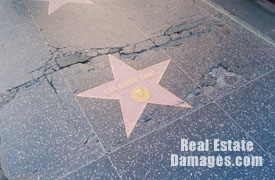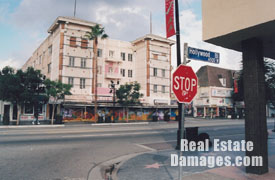Research
Hollywood Sinkhole
Hollywood Boulevard
Hollywood, California
Class VII - Site Condition, Tunneling Collapse
![]()
 |
Cracked Sidewalk |
The Los Angeles Metropolitan Transit Authority broke ground in 1983 for the construction of the Red Line, which now connects downtown LA with North Hollywood. The first phase was completed January 30, 1993, and the second phase was completed in July 1996 at Western and Wilshire Boulevards and in November 1998 at Hollywood and Vine. In August of 1994, the construction crew punched-through one of two tunnel segments 80 feet below Hollywood Boulevard. Subsidence was anticipated to be 1/2", however, 2" resulted. The second tunnel segment was punched-through 21 days later, which resulted in 5" to 6" of subsidence, with a maximum subsidence of 10". The cause was attributed to a variety of factors, including water content in the soil and the alleged use of improper materials in the support shield of the tunnel.
 |
Condemned Hotel |
The most significant damage occurred in the 6500 block of Hollywood Boulevard between Vine and the El Capitan Theater; several buildings incurred severe damage, such as storefronts separating from the main portion of the structures. The most damage occurred at Hudson Street to an apartment building and a three-story retail/office building. On June 22, 1995, alleged faulty and "unrealistic" design work triggered the dramatic 80-foot-wide sinkhole within the 6300 block off Hollywood Boulevard. Transit officials were forced to shut down the street again on June 27th, after discovering a cluster of serious cracks in the tunnel near the giant sinkhole. The problem was brought under control within a few months after it occurred, however, it left visible signs, such as cracked and boarded-up buildings. Further compounding the problem of restitution and remodeling is the fact that many of the damaged buildings were within the Historic District, preventing their demolition. Many structures that otherwise should have been demolished were instead restored, but at significantly higher costs
<<Return to Research Page
